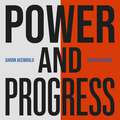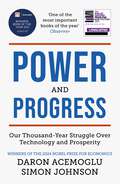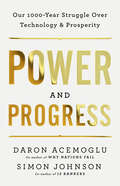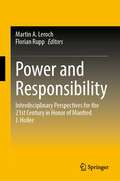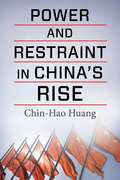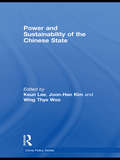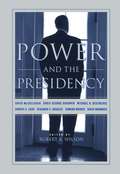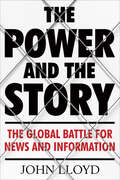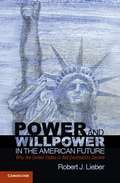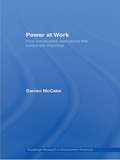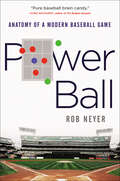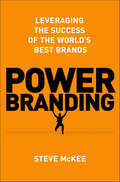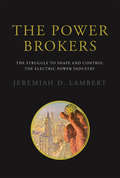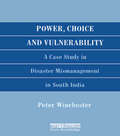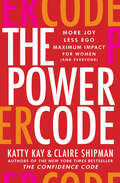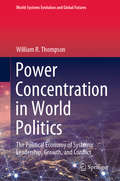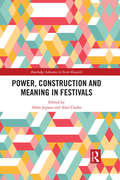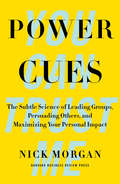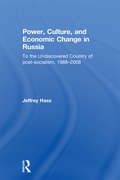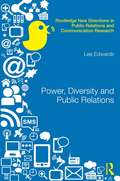- Table View
- List View
Power and Progress: Our Thousand-Year Struggle Over Technology and Prosperity
by Simon Johnson Daron AcemogluTwo bestselling authors deliver a bold new interpretation of why technology has all too often benefited elites - and how we must reshape the path of innovation to create true shared prosperity.A thousand years of history and contemporary evidence make one thing clear. Progress is not automatic but depends on the choices we make about technology. New ways of organizing production and communication can either serve the narrow interests of an elite or become the foundation for widespread prosperity.Much of the wealth generated by agricultural advances during the European Middle Ages was captured by the Church and used to build grand cathedrals while the peasants starved. The first hundred years of industrialization in England delivered stagnant incomes for workers, while making a few people very rich. And throughout the world today, digital technologies and artificial intelligence increase inequality and undermine democracy through excessive automation, massive data collection, and intrusive surveillance.It doesn't have to be this way. Power and Progress demonstrates that the path of technology was once - and can again be - brought under control. The tremendous computing advances of the last half century can become empowering and democratizing tools, but not if all major decisions remain in the hands of a few hubristic tech leaders striving to build a society that elevates their own power and prestige.With their breakthrough economic theory and manifesto for a better society, Acemoglu and Johnson provide the understanding and the vision to reshape how we innovate and who really gains from technological advances so we can create real prosperity for all.(P) 2023 Hachette Audio
Power and Progress: Our Thousand-Year Struggle Over Technology and Prosperity
by Simon Johnson Daron Acemoglu'The blueprint we need for the challenges ahead' Shoshana Zuboff'If you are not already an addict of Daron Acemoglu and Simon Johnson's previous books, Power and Progress is guaranteed to make you one' Jared Diamond'A breathtaking tour of the history and future of technology' Abhijit Banerjee and Esther DufloA bold new interpretation of why technology has all too often benefited elites - and how we must reshape the path of innovation to create true shared prosperity.A thousand years of history and contemporary evidence make one thing clear. Progress is not automatic but depends on the choices we make about technology. New ways of organizing production and communication can either serve the narrow interests of an elite or become the foundation for widespread prosperity.Much of the wealth generated by agricultural advances during the European Middle Ages was captured by the Church and used to build grand cathedrals while the peasants starved. The first hundred years of industrialization in England delivered stagnant incomes for workers, while making a few people very rich. And throughout the world today, digital technologies and artificial intelligence increase inequality and undermine democracy through excessive automation, massive data collection, and intrusive surveillance.It doesn't have to be this way. Power and Progress demonstrates that the path of technology was once - and can again be - brought under control. The tremendous computing advances of the last half century can become empowering and democratizing tools, but not if all major decisions remain in the hands of a few hubristic tech leaders striving to build a society that elevates their own power and prestige.With their breakthrough economic theory and manifesto for a better society, Acemoglu and Johnson provide the understanding and the vision to reshape how we innovate and who really gains from technological advances so we can create real prosperity for all.
Power and Progress: Our Thousand-Year Struggle Over Technology and Prosperity
by Simon Johnson Daron AcemogluThe bestselling co-author of Why Nations Fail and the bestselling co-author of 13 Bankers deliver a bold reinterpretation of economics and history that will fundamentally change how you see the world A thousand years of history and contemporary evidence make one thing clear: progress depends on the choices we make about technology. New ways of organizing production and communication can either serve the narrow interests of an elite or become the foundation for widespread prosperity. The wealth generated by technological improvements in agriculture during the European Middle Ages was captured by the nobility and used to build grand cathedrals, while peasants remained on the edge of starvation. The first hundred years of industrialization in England delivered stagnant incomes for working people. And throughout the world today, digital technologies and artificial intelligence undermine jobs and democracy through excessive automation, massive data collection, and intrusive surveillance. It doesn&’t have to be this way. Power and Progress demonstrates the path of technology was once—and may again—be brought under control. Cutting-edge technological advances can become empowering and democratizing tools, but not if all major decisions remain in the hands of a few hubristic tech leaders. With their bold reinterpretation of economics and history, Daron Acemoglu and Simon Johnson fundamentally change how we see the world, providing the vision needed to redirect innovation so it again benefits most people.
Power and Responsibility: Interdisciplinary Perspectives for the 21st Century in Honor of Manfred J. Holler
by Martin A. Leroch Florian RuppWritten by leading scholars from various disciplines, this book presents current research on topics such as public choice, game theory, and political economy. It features contributions on fundamental, methodological, and empirical issues around the concepts of power and responsibility that strive to bridge the gap between different disciplinary approaches. The contributions fall into roughly four sub-disciplines: voting and voting power, public economics and politics, economics and philosophy, as well as labor economics.On the occasion of his 75th birthday, this book is written in honor of Manfred J. Holler, an economist by training and profession whose work as a guiding light has helped advance our understanding of the interdisciplinary connections of concepts of power and responsibility. He has written many articles and books on game theory, and worked extensively on questions of labor economics, politics, and philosophy.
Power and Restraint in China's Rise (Contemporary Asia in the World)
by Chin-Hao HuangConventional wisdom holds that China’s rise is disrupting the global balance of power in unpredictable ways. However, China has often deferred to the consensus of smaller neighboring countries on regional security rather than running roughshod over them. Why and when does China exercise restraint—and how does this aspect of Chinese statecraft challenge the assumptions of international relations theory?In Power and Restraint in China’s Rise, Chin-Hao Huang argues that a rising power’s aspirations for acceptance provide a key rationale for refraining from coercive measures. He analyzes Chinese foreign policy conduct in the South China Sea, showing how complying with regional norms and accepting constraints improves external perceptions of China and advances other states’ recognition of China as a legitimate power. Huang details how member states of the Association of Southeast Asian Nations have taken a collective approach to defusing tension in maritime disputes, incentivizing China to support regional security initiatives that it had previously resisted. Drawing on this empirical analysis, Huang develops new theoretical perspectives on why great powers eschew coercion in favor of restraint when they seek legitimacy. His framework explains why a dominant state with rising ambitions takes the views and interests of small states into account, as well as how collective action can induce change in a major power’s behavior. Offering new insight into the causes and consequences of change in recent Chinese foreign policy, this book has significant implications for the future of engagement with China.
Power and Sustainability of the Chinese State (China Policy Series)
by Keun Lee Joon-Han Kim Wing Thye WooSince the start of the 21st century China has risen to the status of an important world power. This book examines Chinese power, focusing in particular, although not exclusively, on its economic capabilities, and considering how this is likely to develop in the future. It provides a detailed assessment of the key facets of Chinese power today, including GDP, growth, multinationals, and technological and scientific innovation. It identifies the key trends in these areas, compares China’s experience with other important global powers such as the US, and considers how this is viewed by the Chinese themselves, including through the lens of their popular culture and mass media. It goes on to identify the foremost problems facing China and the Chinese state today, including fiscal management and public finance, poverty, inequality and rural development, and considers whether China is capable of overcoming these challenges and continuing its remarkable economic development. It addresses crucial questions such as the impact of globalization on Chinese power, and whether Communist Party rule is sustainable for the foreseeable future.
Power and the Presidency
by Robert A. WilsonThis sterling collection of original, never-before-published essays on six fascinating contemporary presidents by some of the leading presidential biographers of our time is must reading for anyone interested in American politics, the history of the American presidency, or the lives of the presidents. Each essay-extending and elaborating on lectures originally delivered as part of the Montgomery Lecture Series at Dartmouth University-explores how a particular president came to power, wielded power, and was changed by power, and how each presidency affected the power of the office itself. The presidencies addressed are those of Roosevelt, Eisenhower, Kennedy, Johnson, Reagan, and Clinton. Published as our nation begins the process of electing the 43rd president, during a time when some believe the independence of the office itself is at stake, Power and the Presidency is a timely and thought-provoking look at the nature of power in American democracy.
The Power and the Story: The Global Battle for News and Information
by John LloydIn this sweeping global survey, one of Britain's most distinguished journalists and media commentators analyses for the first time the state of journalism worldwide as it enters the post-truth age. From the decline of the newspaper in the West and the simultaneous threats posed by fake news and President Trump, to the part that Facebook and Twitter played in the Arab revolts and the radical openness stimulated by WikiLeaks, and from the vast political power of Rupert Murdoch's News International and the merger of television and politics in Italy, to the booming, raucous and sometimes corrupt Indian media and the growing self-confidence of African journalism, John Lloyd examines the technological shifts, the political changes and the market transformations through which journalism is currently passing. The Power and the Story offers a fascinating insight into a trade that has claimed the right to hold power to account and the duty to make the significant interesting—while making both the first draft of history, and a profit.
Power and the Vote
by Brian MinHow do developing states decide who gets access to public goods like electricity, water, and education? Power and the Vote breaks new ground by showing that the provision of seemingly universal public goods is intricately shaped by electoral priorities. In doing so, this book introduces new methods using high-resolution satellite imagery to study the distribution of electricity across and within the developing world. Combining cross-national evidence with detailed sub-national analysis and village-level data from India, Power and the Vote affirms the power of electoral incentives in shaping the distribution of public goods and challenges the view that democracy is a luxury of the rich with little relevance to the world's poor.
Power and Welfare: Understanding Citizens' Encounters with State Welfare (Social And Political Power Mup Ser.)
by Nanna Mik-Meyer Kaspar VillardsenIn the welfare provision of today, power takes both the shape of juridical sanctions and of attractive offers for self-development. When state institutions punish criminals, remove children at risk, or enforce sanctions upon welfare recipients the question of power is immediately urgent. It is less readily evident that power is at stake when institutions educate, counsel or ‘empower’ citizens. This book offers a framework for understanding and analyzing these complex and implicit forms of power at play in the encounters between citizens and welfare institutions. Taking as its starting point the idea that power takes many different shapes, and that different approaches to power may be necessary in the diverse contexts where citizens encounter welfare professionals, the book demonstrates how significant social theorists, spanning from Goffman to Foucault, can be used for inquiries into these encounters. Guiding the reader from their epistemological foundations to lucid ‘state of the art’ case examples, the book unpacks each of its six theoretical perspectives, and explains selected key concepts and explicates their potential for analysis. The final chapter discusses the usefulness of the theoretical approaches, their weaknesses and indicates some possibilities of theoretical integration. Including case studies of patients, nursing home residents, unemployed people, homeless people, and young offenders, from the USA, Denmark, France, Sweden, Canada, and Australia, Power and Welfare is designed for students and researchers of social policy, sociology, anthropology, political science, education, nursing and social work.
Power and Willpower in the American Future
by Robert J. LieberTo argue against the widely proclaimed idea of American decline, as this book does, might seem a lonely task. After all, the problems are real and serious. Yet if we take a longer view, much of the discourse about decline appears exaggerated, hyperbolic, and ahistorical. Why? First, because of the deep underlying strengths of the United States. These include not only size, population, demography, and resources, but also the scale and importance of its economy and financial markets, its scientific research and technology, its competitiveness, its military power, and its attractiveness to talented immigrants. Second, there is the weight of history and of American exceptionalism. Throughout its history, the United States has repeatedly faced and eventually overcome daunting challenges and crises. Contrary to a prevailing pessimism, there is nothing inevitable about American decline. Flexibility, adaptability, and the capacity for course correction provide the United States with a unique resilience that has proved invaluable in the past and will do so in the future. Ultimately, the ability to avoid serious decline is less a question of material factors than of policy, leadership, and political will.
Power at Work: How Employees Reproduce the Corporate Machine (Routledge Research In Employment Relations Ser.)
by Darren McCabeProviding detailed insights into working life, McCabe, a well known author in the fields of organization studies, labour process theory and critical management studies offers a distinctive approach to innovation in the work place. In this ethnography of a major US bank he argues that many innovations associated with thenew corporation seem to re
Power Autonomy: Using the Biosphere's Rules to Renew Your Company With Renewable Energy
by Gregory C. UnruhExcessive global dependence on fossil fuels is a zero-sum competition that can cost your business dearly. While scientists may disagree about the impact of current levels of climate-changing greenhouse gases, they are essentially unanimous that the forecasted increases will be environmentally ruinous-and potentially ruinous for your company's productivity and reputation. Just as plants carry their energy technology within their structure, your company can integrate power autonomy into its fundamental processes-insulating your company from the risks of convulsing energy markets and impending regulatory restrictions on fossil fuel, but also creating more appealing products for customers, and saving you money. This chapter provides a customizeable approach to switching to renewable energy, including which aspects of your company you should focus on, why investing in altering existing power processes that were designed with cheap fossil fuels in mind won't be enough, and how power autonomy should fit together with your other efforts to align your business with the biosphere's rules. This chapter was originally published as Chapter 2 of "Earth, Inc.: Using Nature's Rules to Build Sustainable Profits."
Power Ball: Anatomy of a Modern Baseball Game
by Rob NeyerCasey Award Winner for Best Baseball Book of the Year: “Deep knowledge and punchy prose . . . a treat for dedicated fans.” —Publishers WeeklyOn September 8, 2017, the Oakland A’s faced off against the Houston Astros in a game that would signal the passing of the Moneyball mantle. Though it was only one regular-season game, the match-up demonstrated how Major League Baseball had changed since the early days of Athletics general manager Billy Beane and the publication of Michael Lewis’ classic book. In Power Ball, former ESPN columnist and analytics pioneer Rob Neyer dramatically recreates this action-packed game to reveal those myriad changes.Over the past twenty years, power and analytics have taken over the game, driving carefully calibrated teams like the Astros to victory. Seemingly every pitcher now throws mid-90s heat and studiously compares their mechanics against the ideal. Every batter in the lineup can crack homers and knows their launch angles. Teams are relying on unorthodox strategies, including using power-losing—purposely tanking a few seasons to get the best players in the draft.As he chronicles each inning and the unfolding drama as these two teams continually trade the lead right down to the bottom of the ninth, Neyer considers the players and managers, the front office machinations, the role of sabermetrics, and the current thinking about what it takes to build a great team, to answer the most pressing questions fans have about the sport today.“The scope of this book ranges . . . engagingly, from the potential impact of climate change on the game and the influence of social media on players, to the evolving fashions of player uniforms and hair styles . . . [The] prose is sharp and colorful and based on a deep understanding of the game.” — The Wall Street Journal“Pure baseball brain candy.” —Dirk Hayhurst, author of The Bullpen Gospels“Captures the humor and humanity in the game, as well as what makes the revelry and rivalry of baseball so special.” —Library Journal
Power Branding: Leveraging the Success of the World's Best Brands
by Steve McKeeEvery one of the largest, most successful corporations were, at some point, mere startups. McKee explains what enables some companies to growbigger and better, while others stumble along year after year, running but never winning the race. The difference is that the biggest and best brands aren't slaves to conventional marketing wisdom. McKee shows by example how the same, sometimes counter-intuitive, strategies used by the biggest brands can also best serve small and mid-sized companies. Among the topics explored: How can a company grow big by thinking small? Why do the best companies sometimes avoid being better? Why do brands that create the most memorable advertising stay away from focus groups? What is the secret to an effective slogan? When can admitting a negative become a positive? A diverse selection of companies provides powerful lessons, ranging from traditional icons like Coca-Cola, McDonald's, and General Motors, to new media models like Google and Facebook. This book appeals not only to time- starved executives, but also to middle managers and owners of small businesses who have a wide variety of marketing problems to address and who need to change the way they think about how to generate healthy, consistent growth.
The Power Brokers: The Struggle to Shape and Control the Electric Power Industry (The\mit Press Ser.)
by Jeremiah D. LambertHow the interplay between government regulation and the private sector has shaped the electric industry, from its nineteenth-century origins to twenty-first-century market restructuring.For more than a century, the interplay between private, investor-owned electric utilities and government regulators has shaped the electric power industry in the United States. Provision of an essential service to largely dependent consumers invited government oversight and ever more sophisticated market intervention. The industry has sought to manage, co-opt, and profit from government regulation. In The Power Brokers, Jeremiah Lambert maps this complex interaction from the late nineteenth century to the present day. Lambert's narrative focuses on seven important industry players: Samuel Insull, the principal industry architect and prime mover; David Lilienthal, chairman of the Tennessee Valley Authority (TVA), who waged a desperate battle for market share; Don Hodel, who presided over the Bonneville Power Administration (BPA) in its failed attempt to launch a multi-plant nuclear power program; Paul Joskow, the MIT economics professor who foresaw a restructured and competitive electric power industry; Enron's Ken Lay, master of political influence and market-rigging; Amory Lovins, a pioneer proponent of sustainable power; and Jim Rogers, head of Duke Energy, a giant coal-fired utility threatened by decarbonization. Lambert tells how Insull built an empire in a regulatory vacuum, and how the government entered the electricity marketplace by making cheap hydropower available through the TVA. He describes the failed overreach of the BPA, the rise of competitive electricity markets, Enron's market manipulation, Lovins's radical vision of a decentralized industry powered by renewables, and Rogers's remarkable effort to influence cap-and-trade legislation. Lambert shows how the power industry has sought to use regulatory change to preserve or secure market dominance and how rogue players have gamed imperfectly restructured electricity markets. Integrating regulation and competition in this industry has proven a difficult experiment.
Power, Choice and Vulnerability: A Case Study in Disaster Mismanagement in South India
by Peter WinchesterNatural disasters make dramatic reading. Every year, some area of the world is devastated by a disaster, with enormous consequent loss of life and disruption to livelihoods. What can be done to alleviate this? Why are such disasters so lethal? Why do people expose themselves to such hazards? Do mitigation programmes help? What effect does aid really have on the areas that receive it? By examining one particular cyclone-prone area of Southern India in great detail over a 10-year period Peter Winchester has come up with some perceptive answers to the questions. In particular, he formulates a set of five 'golden rules' for disaster management. The book will provide valuable and thought-provoking reading for anyone involved with disaster management, and will be essential for all those whose work involves aid or development in disaster-prone areas.
The Power Code: More Joy. Less Ego. Maximum Impact for Women (and Everyone).
by Katty Kay Claire ShipmanPower is not working—for women, for men, or for the world. We don’t need to remake women. We need to remake power.New York Times bestselling authors Katty Kay and Claire Shipman are on a mission to reclaim power for women. In the wake of sweeping changes in the way we work, the veteran journalists challenge preconceived notions of what power is and what it’s good for, along with the insidious, mostly hidden structures of the status quo that hold women back. What started as a straightforward examination of best practices has become a manifesto for a new form of power, a distinctly female version that is already emerging in workplaces, in politics, and on the home front. It’s a version that is more appealing to women (and most men as well). It offers women a blueprint for shaping their own professional futures, maximizing their impact for the benefit of others, and experiencing the real joy that comes from taking the reins and influencing outcomes. Writing from their own lived experiences, Kay and Shipman interviewed dozens of women of all ages, races, and backgrounds around the world, as well as cutting-edge academic researchers. Taken together, these perspectives offer a clear-eyed and hopeful redesign of the workplace and our relationships at home, one that puts women in a remade and modernized seat of power. And now is exactly the right moment for women to step into their power. What’s at stake is much greater than the next job; it’s about the need for a new vision of what power can be, for a new code that focuses not simply on hierarchy, on having power over others, but also on purpose, on what power can achieve.Both a prescription for societal change and a pro-fessional guidebook for individual women, The Power Code shows you how to leverage the power you already have, find new sources of power in yourself and your community, and remodel your workplace and your home-life to produce less ego, more joy, and maximum impact.
Power Concentration in World Politics: The Political Economy of Systemic Leadership, Growth, and Conflict (World-Systems Evolution and Global Futures)
by William R. ThompsonThis book discusses the role of space, time and cyclical behavior in world politics. More specifically, the political-economic role of lead economies – the world’s most innovative economies for finite periods of time – in world politics. These represent unusual concentrations of new technologies, energy sources, and military capabilities of global reach that play disproportional roles in the conduct of international affairs and the provision of limited governance at the most macro level. They also possess close links to economic growth and intense conflict. The book describes the economic, military and political processes behind the systemic leadership of a state at the international level. It also highlights the economic preconditions of systemic leadership, such as economic monopoly of new technologies and energy, which underlie the system leader’s material advantage over others. Analyzing lead economies and the evolution of power over a number of centuries, the author demonstrates how disruptions wrought by the emergence of new technologies and energy sources are partly responsible for global conflicts. This book appeals to international relations scholars as well as anyone interested in the political economy of systemic leadership, growth, and conflict in world politics.
Power, Construction and Meaning in Festivals (Routledge Advances in Event Research Series)
by Allan Jepson Alan ClarkeWhether through education, sport or festivity, events form the basis on which we attribute cultural meaning, significance and value to our lives. In this light, community events have the potential to create positive and negative social, cultural, economic and environmental impacts within the community across a wide variety of genres and platforms. This book offers a deeper and more critical insight into the relationships, dynamics and planning processes of festivals and events and the impact this has upon authenticity, cultural consumption and the local communities they serve. It does so by looking at a range of key debates in power theory, event planning and design, event construction, experience and meaning, authenticity, sustainability, social inclusion, accessibility and sponsorship engagement. International case studies are embedded within the chapters, examining the role of stakeholders, local communities, organisers, local governments and infrastructure. This critical event studies text is interdisciplinary and will make valuable reading for students and researchers who are interested in the relationships and dynamics involved in the construction and planning of festivals and events, their immediate impact and their significance for the future.
Power Cues
by Nick MorganTake control of your communications-before someone else doesWhat if someone told you that your behavior was controlled by a powerful, invisible force? Most of us would be skeptical of such a claim-but it's largely true. Our brains are constantly transmitting and receiving signals of which we are unaware. Studies show that these constant inputs drive the great majority of our decisions about what to do next-and we become conscious of the decisions only after we start acting on them. Many may find that disturbing. But the implications for leadership are profound.In this provocative yet practical book, renowned speaking coach and communication expert Nick Morgan highlights recent research that shows how humans are programmed to respond to the nonverbal cues of others-subtle gestures, sounds, and signals-that elicit emotion. He then provides a clear, useful framework of seven "power cues" that will be essential for any leader in business, the public sector, or almost any context. You'll learn crucial skills, from measuring nonverbal signs of confidence, to the art and practice of gestures and vocal tones, to figuring out what your gut is really telling you.This concise and engaging guide will help leaders and aspiring leaders of all stripes to connect powerfully, communicate more effectively, and command influence.
Power Cues
by Nick MorganTake control of your communications-before someone else doesWhat if someone told you that your behavior was controlled by a powerful, invisible force? Most of us would be skeptical of such a claim-but it's largely true. Our brains are constantly transmitting and receiving signals of which we are unaware. Studies show that these constant inputs drive the great majority of our decisions about what to do next-and we become conscious of the decisions only after we start acting on them. Many may find that disturbing. But the implications for leadership are profound.In this provocative yet practical book, renowned speaking coach and communication expert Nick Morgan highlights recent research that shows how humans are programmed to respond to the nonverbal cues of others-subtle gestures, sounds, and signals-that elicit emotion. He then provides a clear, useful framework of seven "power cues" that will be essential for any leader in business, the public sector, or almost any context. You'll learn crucial skills, from measuring nonverbal signs of confidence, to the art and practice of gestures and vocal tones, to figuring out what your gut is really telling you.This concise and engaging guide will help leaders and aspiring leaders of all stripes to connect powerfully, communicate more effectively, and command influence.
Power, Culture, and Economic Change in Russia: To the undiscovered country of post-socialism, 1988-2008
by Jeffrey K HassUtilising cutting-edge theory and unique data, this book examines the role of power, culture, and practice in Russia’s story of post-socialist economic change, and provides a framework for addressing general economic change. No other book places power and culture as centrally as this, and in doing so it provides new insights not only into how Russia came to its present state under Putin, but also how economies operate and change generally. In particular, the importance of remaking authority and culture - creating and contesting new categories and narratives of meaning - is shown as central to Russia’s story, and to the story of economies overall. Power, Culture and Economic Change in Russia is an excellent research tool for advanced undergraduate and postgraduate students of sociology, political science, economics, area studies, and other related disciplines.
Power, Dependence, and Effective Management
by John P. KotterIn today's large and complex organizations, the effective performance of most managerial jobs requires one to be skilled at the acquisition and use of power. It is primarily because of the dependence on others inherent in managerial jobs that the dynamics of power necessarily form an important part of a manager's processes. To help cope with dependency relationships, effective managers create, increase, or maintain different types of power over others.
Power, Diversity and Public Relations (Routledge New Directions in PR & Communication Research)
by Lee EdwardsPower, Diversity and Public Relations addresses the lack of diversity in PR by revealing the ways in which power operates within the occupation to construct archetypal practitioner identities, occupational belonging and exclusion. It explores the ways in which the field is normatively constructed through discourse, and examines how the experiences of practitioners whose ethnicity and class differ from the ‘typical’ PR background, shape alternative understandings of the occupation and their place within it. The book applies theoretical perspectives ranging from Bourdieuvian and occupational sociology to postcolonial and critical race theory, to a variety of empirical data from the UK PR industry. Diversity emerges as a product of the dialectics between occupational structures, norms and practitioners’ reactions to those constraints; it follows that improving diversity is best understood as an exercise in democracy, where all practitioner voices are heard, valued, and encompass the potential for change. This insightful text will be essential reading for researchers and students in Public Relations, Communications, Media Studies, Promotional Industries, as well as all scholars interested in the sociology of race and work relations.
